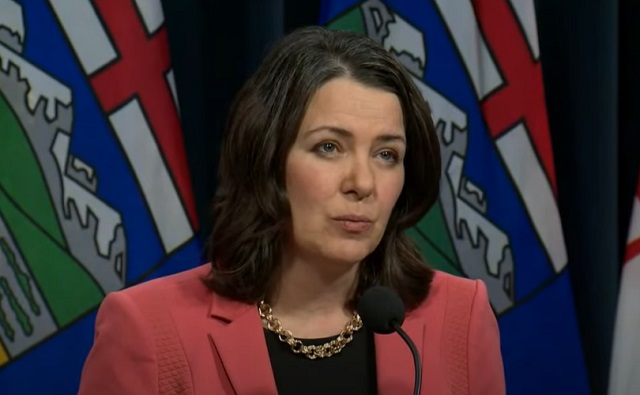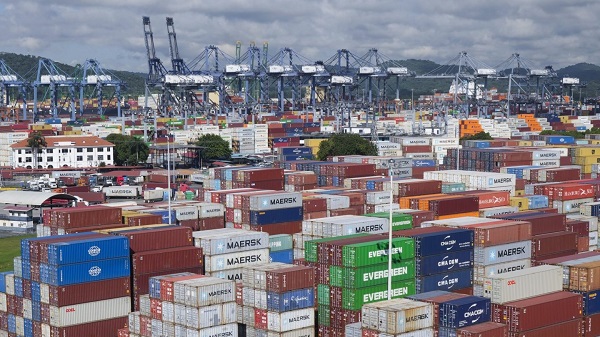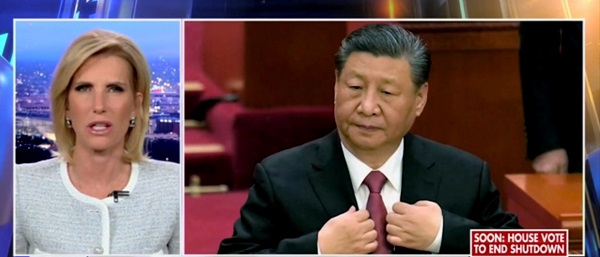Alberta
Danielle Smith blasts Trudeau gov’t as ‘lawless’ for pushing climate policies despite court rulings

From LifeSiteNews
‘We’re getting pretty frustrated, they’ve had a Supreme Court loss now that says that they cannot use their federal power as a pretext to invade provincial jurisdiction. And they’re acting like that Supreme Court case didn’t happen’
Alberta Premier Danielle Smith tore a page off Prime Minister Justin Trudeau by saying he runs a “lawless federal government” for pushing ahead with his 2035 net zero energy law, despite the fact Canada’s constitution allows provinces full jurisdiction over their natural resources.
“We’re getting pretty frustrated, they’ve had a Supreme Court loss now that says that they cannot use their federal power as a pretext to invade provincial jurisdiction,” said Smith yesterday to reporters after being asked about Trudeau’s looming new energy regulations.
“And they’re acting like that Supreme Court case didn’t happen.”
Smith then lambasted the Trudeau’s federal government for appearing to ignore another court ruling which ruled against its single-use plastics ban.
“They had another loss on the issue of plastics, which was also an unconstitutional overreach and unreasonable. And instead of accepting the court’s judgment, they’re going to drag it out again,” Smith said.
“So, we’ve got a lawless federal government. And when you have a lawless federal government, then you’ve got to assert that the Constitution matters. We’ve got the Supreme Court behind us. We’re continuing to press that matter, they haven’t dropped it yet, but I can tell you, we are, just like [Saskatchewan] Premier [Scott] Moe, are getting increasingly frustrated.”
Smith’s comments come considering two recent court rulings, the most recent being the Federal Court of Canada on November 16 overturning the Trudeau government’s ban on single-use plastic, calling it “unreasonable and unconstitutional.”
The Federal Court ruled in favor of the provinces of Alberta and Saskatchewan by stating that Trudeau’s government had overstepped its authority by classifying plastic as “toxic” as well as banning all single-use plastic items, like straws, bags, and eating utensils.
Smith celebrated the court’s decision by saying it was a big “win” yet again for Alberta.
“Like Bill C-69, the federal government’s decision to unilaterally label perfectly safe plastic consumer products as ‘toxic’ has had wide-ranging consequences for Alberta’s economic interests and has put thousands of jobs and billions of investments at risk,” Smith said after the court ruling.
The second victory for Alberta and Saskatchewan concerns a Supreme Court ruling that stated that Trudeau’s law, C-69, dubbed the “no-more pipelines” bill, is “mostly unconstitutional.” The decision returned authority over the pipelines to provincial governments, meaning oil and gas projects headed up by the provinces should be allowed to proceed without federal intrusion.
The Trudeau government, however, seems insistent on defying the recent rulings by pushing forward with its various regulations.
Smith did not take kindly to this. “Like Bill C-69, the federal government’s decision to unilaterally label perfectly safe plastic consumer products as ‘toxic’ has had wide-ranging consequences for Alberta’s economic interests and has put thousands of jobs and billions of investments at risk,” Smith said.
“It’s time for the federal government to listen to the courts and to Canadians,” she added. “We urge them to not appeal this decision, and to immediately delete ‘plastic manufactured items’ from Schedule 1 of the current Canadian Environmental Protection Act to avoid further need of legal action by Alberta and other provinces.”
Despite Smith urging them to not appeal, the Trudeau government has moved to create and back an United Nations treaty to ban “plastic pollution” by 2024.
Trudeau’s ‘Clean Electricity Regulations’ could cause power bills to skyrocket
Smith’s comments against Trudeau also come as a draft version of the federal government’s “Clean Electricity Regulations” (CER) project billions in higher costs associated with a so-called “green” power transition, especially in the resource-rich provinces of Alberta, Saskatchewan, New Brunswick, and Nova Scotia, which use natural gas and coal to fuel power plants.
Business executives in Alberta’s energy sector have also sounded the alarm over the Trudeau government’s “green” transition, saying it could lead to unreliability in the power grid.
In addition to Smith, Saskatchewan Premier Scott Moe has likewise promised to fight back against Trudeau’s new regulations, recently saying that “Trudeau’s net-zero electricity regulations are unaffordable, unrealistic and unconstitutional.”
In September, Smith announced she is preparing to use her province’s Sovereignty Act to fight the electricity regulations if the Trudeau government does not back down.
Smith earlier this week vowed that Alberta would not be phasing out oil and gas, despite the regulations proposed by Trudeau’s government.
The Trudeau government is trying to force net zero regulations on all Canadian provinces, notably on electricity generation, as early as 2035. His government has also refused to extend a carbon tax exemption on heating fuels to all provinces, allowing only Atlantic provinces this benefit.
Alberta has repeatedly promised to place the interests of their people above the Trudeau government’s “unconstitutional” demands while consistently reminding the federal government that their infrastructures and economies depend upon oil, gas, and coal.
Smith even recently tore a page off a heckler’s fantasy suggestion of a solar and wind battery-powered future after she stepped into the lion’s den to advocate for oil and gas at a conference hosted by a pro-climate change think-tank.
The Trudeau government’s current environmental goals – in lockstep with the United Nations’ “2030 Agenda for Sustainable Development” – include phasing out coal-fired power plants, reducing fertilizer usage, and curbing natural gas use over the coming decades.
The reduction and eventual elimination of the use of so-called “fossil fuels” and a transition to unreliable “green” energy has also been pushed by the World Economic Forum (WEF) – the globalist group behind the socialist “Great Reset” agenda – an organization in which Trudeau and some of his cabinet are involved.
Alberta
ChatGPT may explain why gap between report card grades and standardized test scores is getting bigger

From the Fraser Institute
By Paige MacPherson and Max Shang
In Alberta, the gap between report card grades and test/exam scores increased sharply in 2022—the same year ChatGPT came out.
Report card grades and standardized test scores should rise and fall together, since they measure the same group of students on the same subjects. But in Alberta high schools, report card grades are rising while scores on Provincial Achievement Tests (PAT) and diploma exams are not.
Which raises the obvious question—why?
Report card grades partly reflect student performance in take-home assignments. Standardized tests and diploma exams, however, quiz students on their knowledge and skills in a supervised environment. In Alberta, the gap between report card grades and test/exam scores increased sharply in 2022—the same year ChatGPT came out. And polling shows Canadian students now rely heavily on ChatGPT (and other AI platforms).
Here’s what the data show.
In Alberta, between 2016 and 2019 (the latest year of available comparable data), the average standardized test score covering math, science, social study, biology, chemistry, physics, English and French language arts was just 64, while the report card grade 73.3—or 14.5 per cent higher. Data for 2020 and 2021 are unavailable due to COVID-19 school closures, but between 2022 and 2024, the gap widened to 20 per cent. This trend holds regardless of school type, course or whether the student was male or female. Across the board, since 2022, students in Alberta high schools are performing significantly better in report card grades than on standardized tests.
Which takes us back to AI. According to a recent KPMG poll, 73 per cent of students in Canada (high school, vocational school, college and university) said they use generative AI in their schoolwork, an increase from the previous year. And 71 per cent say their grades improved after using generative AI.
If AI is simply used to aid student research, that’s one thing. But more than two-thirds (66 per cent) of those using generative AI said that although their grades increased, they don’t think they’re learning or retaining as much knowledge. Another 48 per cent say their “critical thinking” skills have deteriorated since they started using AI.
Acquiring knowledge is the foundation of higher-order thinking and critical analysis. We’re doing students a deep disservice if we don’t ensure they expand their knowledge while in school. And if teachers award grades, which are essentially inflated by AI usage at home, they set students up for failure. It’s the academic equivalent of a ski coach looking at a beginner and saying, “You’re ready for the black diamond run.” That coach would be fired. Awarding AI-inflated grades is not fair to students who will later struggle in college, the workplace or life beyond school.
Finally, the increasing popularity of AI underscores the importance of standardized testing and diploma exams. And parents knew this even before the AI wave. A 2022 Leger poll found 95 per cent of Canadian parents with kids in K-12 schools believe it’s important to know their child’s academic performance in the core subjects by a fair and objective measure. Further, 84 per cent of parents support standardized testing, specifically, to understand how their children are doing in reading, writing and mathematics. Alberta is one of the only provinces to administer standardized testing and diploma exams every year.
Clearly, parents should oppose any attempt to reduce accountability and objective testing in Alberta schools.
Alberta
How economic corridors could shape a stronger Canadian future

Ship containers are stacked at the Panama Canal Balboa port in Panama City, Saturday, Sept. 20, 2025. The Panama Canals is one of the most significant trade infrastructure projects ever built. CP Images photo
From the Canadian Energy Centre
Q&A with Gary Mar, CEO of the Canada West Foundation
Building a stronger Canadian economy depends as much on how we move goods as on what we produce.
Gary Mar, CEO of the Canada West Foundation, says economic corridors — the networks that connect producers, ports and markets — are central to the nation-building projects Canada hopes to realize.
He spoke with CEC about how these corridors work and what needs to change to make more of them a reality.
CEC: What is an economic corridor, and how does it function?
Gary Mar: An economic corridor is a major artery connecting economic actors within a larger system.
Consider the road, rail and pipeline infrastructure connecting B.C. to the rest of Western Canada. This infrastructure is an important economic corridor facilitating the movement of goods, services and people within the country, but it’s also part of the economic corridor connecting western producers and Asian markets.
Economic corridors primarily consist of physical infrastructure and often combine different modes of transportation and facilities to assist the movement of many kinds of goods.
They also include social infrastructure such as policies that facilitate the easy movement of goods like trade agreements and standardized truck weights.
The fundamental purpose of an economic corridor is to make it easier to transport goods. Ultimately, if you can’t move it, you can’t sell it. And if you can’t sell it, you can’t grow your economy.
CEC: Which resources make the strongest case for transport through economic corridors, and why?
Gary Mar: Economic corridors usually move many different types of goods.
Bulk commodities are particularly dependent on economic corridors because of the large volumes that need to be transported.
Some of Canada’s most valuable commodities include oil and gas, agricultural commodities such as wheat and canola, and minerals such as potash.
CEC: How are the benefits of an economic corridor measured?
Gary Mar: The benefits of economic corridors are often measured via trade flows.
For example, the upcoming Roberts Bank Terminal 2 in the Port of Vancouver will increase container trade capacity on Canada’s west coast by more than 30 per cent, enabling the trade of $100 billion in goods annually, primarily to Asian markets.
Corridors can also help make Canadian goods more competitive, increasing profits and market share across numerous industries. Corridors can also decrease the costs of imported goods for Canadian consumers.
For example, after the completion of the Trans Mountain Expansion in May 2024 the price differential between Western Canada Select and West Texas Intermediate narrowed by about US$8 per barrel in part due to increased competition for Canadian oil.
This boosted total industry profits by about 10 per cent, and increased corporate tax revenues to provincial and federal governments by about $3 billion in the pipeline’s first year of operation.
CEC: Where are the most successful examples of these around the world?
Gary Mar: That depends how you define success. The economic corridors transporting the highest value of goods are those used by global superpowers, such as the NAFTA highway that facilitates trade across Canada, the United States and Mexico.
The Suez and Panama canals are two of the most significant trade infrastructure projects ever built, facilitating 12 per cent and five per cent of global trade, respectively. Their success is based on their unique geography.
Canada’s Asia-Pacific Gateway, a coordinated system of ports, rail lines, roads, and border crossings, primarily in B.C., was a highly successful initiative that contributed to a 48 per cent increase in merchandise trade with Asia from $44 million in 2006 to $65 million in 2015.
China’s Belt and Road initiative to develop trade infrastructure in other countries is already transforming global trade. But the project is as much about extending Chinese influence as it is about delivering economic returns.

Piles of coal awaiting export and gantry cranes used to load and unload containers onto and from cargo ships are seen at Deltaport, in Tsawwassen, B.C., on Monday, September 9, 2024. CP Images photo
CEC: What would need to change in Canada in terms of legislation or regulation to make more economic corridors a reality?
Gary Mar: A major regulatory component of economic corridors is eliminating trade barriers.
The federal Free Trade and Labour Mobility in Canada Act is a good start, but more needs to be done at the provincial level to facilitate more internal trade.
Other barriers require coordinated regulatory action, such as harmonizing weight restrictions and road bans to streamline trucking.
By taking a systems-level perspective – convening a national forum where Canadian governments consistently engage on supply chains and trade corridors – we can identify bottlenecks and friction points in our existing transportation networks, and which investments would deliver the greatest return on investment.
-

 Frontier Centre for Public Policy2 days ago
Frontier Centre for Public Policy2 days agoRichmond Mayor Warns Property Owners That The Cowichan Case Puts Their Titles At Risk
-

 Business2 days ago
Business2 days agoMark Carney Seeks to Replace Fiscal Watchdog with Loyal Lapdog
-

 Business2 days ago
Business2 days agoSluggish homebuilding will have far-reaching effects on Canada’s economy
-

 COVID-191 day ago
COVID-191 day agoMajor new studies link COVID shots to kidney disease, respiratory problems
-

 Daily Caller2 days ago
Daily Caller2 days agoLaura Ingraham’s Viral Clash With Trump Prompts Her To Tell Real Reasons China Sends Students To US
-

 Business1 day ago
Business1 day agoP.E.I. Moves to Open IRAC Files, Forcing Land Regulator to Publish Reports After The Bureau’s Investigation
-

 International1 day ago
International1 day agoBondi and Patel deliver explosive “Clinton Corruption Files” to Congress
-

 International1 day ago
International1 day agoState Department designates European Antifa groups foreign terror organizations











